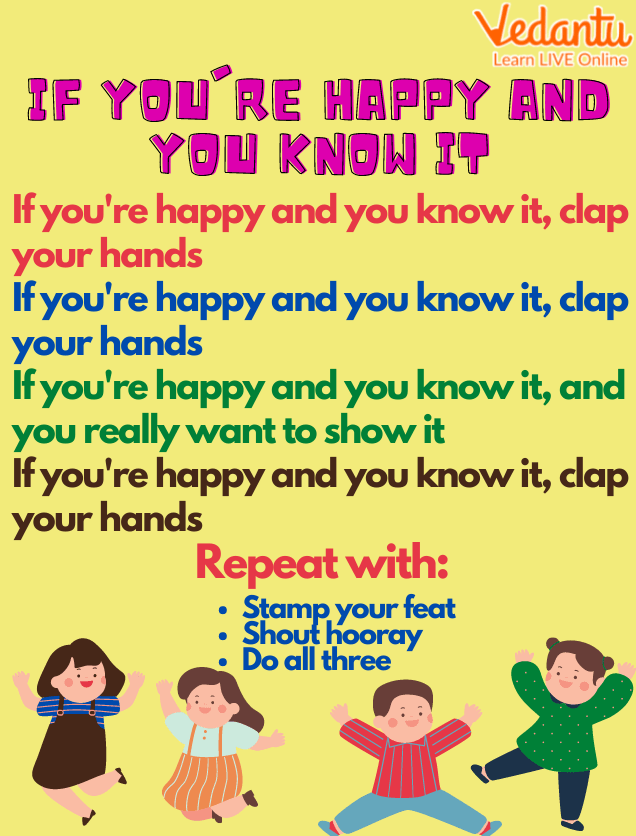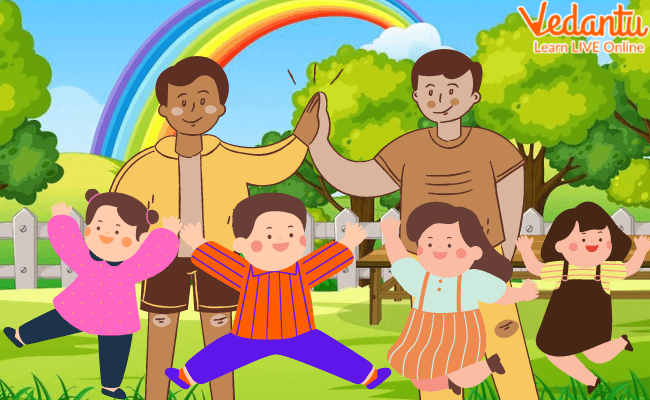An Introduction to the Song - If You’re Happy and You Know It
"If You're Happy and You Know It" is a well-known nursery and kindergarten children's song. The song has been compared to "Molodejnaya," a song from the Soviet musical film Volga-Volga, released in 1938.
There are many other songs that are similar to this. But this particular song has a special status and children will pay much attention to this. In fact, it is not a surprise that even young people and parents also enjoy listening to this song.
Let us know about the song, its origin, and enjoy singing it together.
About the Song
Emotional expression is a vital part of a child's entire development. They will be able to put their sentiments into words, resulting in making family communication more successful. The song "If You're Happy And You Know It, Clap Your Hands" is an excellent way to help your child improve his or her communication abilities. Your young one can learn a few basic, natural ways to express his or her feelings while singing and dancing.
This children's song has long been a favourite due to its catchy beat that children enjoy, as well as the fact that its lines are constantly accompanied by motions that they can readily perform. Some of the primary actions linked with various emotional states that all children experience from time to time are included in this version of the song. Your child will be able to join Lisa the Cat, Cowy the Cow, Bobby the Dog, and Elliot the Panda in a wonderful adventure full of emotions and actions as they sing this song.
Lisa is first showing her joy by clapping her hands and dancing while smiling. It's now Bobby's turn to express his feelings! Bobby has a sad expression on his face, and he shows his sadness by saying "boo hoo." Elliot is now awake, and he does not appear to be in good spirits; in fact, he appears to be angry. By stomping his feet on the floor, Elliot expresses his emotions.
Elliot is in such a bad situation! It's finally Cowy's turn! She's having a good time, and she's letting everyone know it by laughing out loud and making hilarious faces. Encourage your child to sing the song to practise all of these behaviours now that all of the friends have shared their feelings.
After you (as a parent) and your child complete singing the song, you can watch a video of the song together and make them practice performing the movements. As you perform this, ask your child to repeat the names of the different actions in English that you can see on the video, like “clap,” “say,” “stomp,” “laugh,” “shout,” and more actions.
In addition, you may explain to the children that these actions are at times used to express emotions when required, but that it's always better to speak about how he/she is feeling. Through this children's song, your child will be able to practise some vocabulary in English in a natural way too, to express emotions and feelings.
Once you’ve completed learning the words and lyrics of the song, you may try to add your own actions to it! For instance, what does your child do when he/she is scared? Or hungry? Find some of the English words that can relate to these emotions and feelings and have some fun with your child creating your own song.
Origin of the Song
"If You're Happy and You Know It (Clap Your Hands)" is a Latvian folk song that was remade in English, according to some sources. Isaak Dunayevsky is credited with the music because his song "Molodejnaya" (composed for the Soviet film Volga-Volga in 1938) is nearly identical.
Many historians believe the lyrics were modified in the mid-1900s by songwriter Alfred B. Smith.
"Then your face will surely show it" or "Then you definitely ought to show it" are two typical versions of the fourth phrase.

If Your’re Happy and You Know it, Clap Your Hands
The song can be extended by adding further verses in which the line "clap your hands" is replaced with other phrases and actions:
shout "Hurray!"
say "Amen"
slap your legs
turn around
snap your fingers
slap your knees
nod your head
tap your toe
honk your nose
stomp your feet
...etc.
If You’re Happy and You Know It: Lyrics
The Barney & Friends rendition of the nursery rhyme song consists of four verses, with a group of children singing along and performing all of the moves:
If you’re happy and you know it
If you're happy and you know it, clap your hands
If you're happy and you know it, clap your hands
If you're happy and you know it
And you really want to show it
If you're happy and you know it, clap your hands.
If you're happy and you know it, stamp your feet
If you're happy and you know it, stamp your feet
If you're happy and you know it
And you really want to show it
If you're happy and you know it, stamp your feet.
If you're happy and you know it, shout ‘Hurray!’
If you're happy and you know it, shout ‘Hurray!’
If you're happy and you know it
And you really want to show it
If you're happy and you know it, shout ‘Hurray!’
If you're happy and you know it, do all three
If you're happy and you know it, do all three
If you're happy and you know it
And you really want to show it
If you're happy and you know it, do all three.
Now we're going to sing the last verse again
But this time faster.
A lot faster.
If you're happy and you know it, do all three
If you're happy and you know it, do all three
If you're happy and you know it
And you really want to show it
If you're happy and you know it, do all three.

Nursery Rhymes: If You're Happy and You know it, Clap Your Hands
Conclusion
This song is one of the most loved nursery rhymes of all time. Children enjoy singing this as it involves a good number of actions and gestures. As a parent when you join them in singing and acting out the song, it will encourage your child to participate and not shy away from other activities in class. It will further enhance your child’s motor skills. Try replacing the verses with new actions of your own and trigger your ward’s creative skills.


FAQs on If You’re Happy and You Know It - Lyrics
1. Who wrote the song “If You’re Happy and You Know It?”
The author of the song “If You’re Happy and You Know It” is Datia Ben Dor.
2. What is considered to be the origin of the song “If You’re Happy and You Know It” (Nursery Rhyme)?
If You're Happy and You Know It (Nursery Rhyme) is an English song that is believed to have originated from a Latvian folk song, Molodejnaya.





